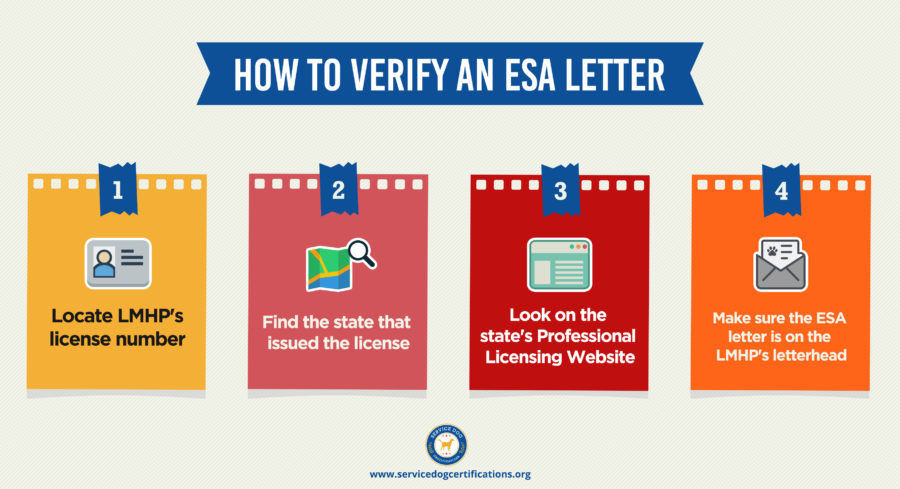Home Page › Blog › Landlord Rights for Emotional Support Animals
Landlord Rights for Emotional Support Animals

According to the NAMI, an estimate of 61.5 million Americans (or 1 in 4) suffer from a mental or emotional disability.
For this reason, the use of Emotional Support Animals (ESA) is becoming more prevalent, and many mental health professionals are recommending animals and writing prescriptions as a therapy tool.
As a landlord or property owner, you might ask yourself, what does that mean for me and for my rental units that have “no pets” policies in place?
In this post, we will cover landlord rights when renting to a tenant with an emotional support animal.
Table of Contents
- The Fair Housing Act (FHA) & Landlords
- Emotional Support Animal Letters for Housing
- How Can a Landlord Verify an ESA Letter?
- ESA Questions a Landlord Has the Right to Ask a Tenant
- ESA Questions a Landlord Does Not Have the Right to Ask a Tenant
- What Kind of Animals Do Landlords Have to Allow?
- How Many Emotional Support Animals Do Landlords Have to Allow?
- Where is the Emotional Support Animal Allowed?
- When Can a Landlord Deny an Emotional Support Animal?
- What About Insurance for Banned Breeds?
- When Can a Landlord Evict a Tenant With an ESA?
- What Fees (If Any) Can a Landlord Charge for an ESA?
- What Could Happen if a Landlord Denies a Tenant Based on an ESA?
The Fair Housing Act (FHA) & Landlords
Under the Fair Housing Act, it is against the law for a property owner or landlord to refuse to house those with a disability.
The housing provider also cannot impose a different application or qualification criteria to those with disabilities. This means the rental fees, sales price, or rental terms or conditions cannot differ from those required by non-disabled persons.
However, the FHA does require written documentation or ESA letter from a licensed mental health professional attesting to the tenant’s need for an Emotional Support Animal. Simply having an ESA registration or vest is not enough to qualify an animal as an ESA.

Emotional Support Animal Letters for Housing
You may or may not have encountered an Emotional Support Animal Letter – these are validation letters from a licensed mental health professional telling you the renter has been prescribed the animal for mental health-related purposes.
This animal is NOT a pet but is there to give the needed therapy the person requires – the emotional support animal or ESA must be responsible for alleviating at least one identified symptoms or effects of an existing disability. This does not mean the animal simply makes the person “feel good.” The ESA must be there for a diagnosable condition such as depression, severe anxiety or phobia.
How Can a Landlord Verify an ESA Letter?
As a landlord, you do have the right to verify that the letter from the therapist is real and from a therapist that is licensed. To do this, you will need to check that the letter is written on the mental health professional’s letterhead, along with their contact information (phone number, email address, practice address).
An ESA Letter should include the professional’s license number, date it was issued, and signature.
If you have any concerns about the validity of the letter, you should NOT contact the mental health professional directly. This could be considered a violation of the patient’s right to privacy.
Questions a Landlord Has the Right to Ask a Tenant That Needs an Emotional Support Animal
As a landlord you have the right to ask your tenant the following questions about their emotional support animal. Remember how you ask is important as well. Here are some tips for speaking with your tenant about their Emotional Support Animal.
Tip 1: Politely speak to the tenant about your concerns.
Let them know you would like to work together to alleviate your concerns. Arguing with the person can make them feel discriminated against and can be used against you should the case go in front of a judge.
Tip 2: Verify the licensed mental health professional’s license number.
You do have the right to verify the mental health professional’s credentials. You can do this by visiting the listed state’s website for the mental health professional’s licensure and entering their license number. You cannot repeatedly call or their LMHP or ask them details about their client’s disability.
Tip 3: Ask tenant for a Reasonable Accommodation Form.
As a landlord, you have the right to ask your tenant for a Reasonable Accommodation Form which would be filled out by the mental health professional that wrote the letter.
Questions a Landlord Does Not Have the Right to Ask a Tenant That Needs an Emotional Support Animal
Remember, you cannot contact the tenant’s therapist directly. There are also limits to the questions you are permitted to ask.
There are several common questions that go against the disabled person’s rights and should not be asked, examples include:
- “Do you have a disability and how severe is it?”
- “How long have you been in therapy?”
- “What medications (if any) do you take?”
- “Let me see your medical records?”
- “Have you ever been hospitalized because of a mental disability?”
- “Have you ever been in a drug rehabilitation program?”
- “How many sessions have you had with your therapist?”
- “Is there anything else at all about your symptoms or diagnosis besides what is provided in this letter?”
What Kind of Animals Do Landlords Have to Allow?
Although dogs and cats are the most common animals used for therapy, your tenant has the right to possess just about any animal as an emotional support animal.
However, that does not mean you have to allow a pet tiger or full-grown horse inside your building. Animals that pose a danger to other tenants or causes an undue financial burden to you can be denied.
Remember, that the tenant is always responsible for their animal(s).
How Many Emotional Support Animals Do Landlords Have to Allow?
The tenant is allowed, under Federal law, to have more than one emotional support animal. As long as the therapist has diagnosed these animals to help alleviate at least one of their patient’s symptoms, it is allowed.
The law does not specify the number allowed or not allowed. It would be difficult to argue against 3 dogs, but if you find that having 10 chickens in the apartment is causing a disturbance or an undue financial burden, you may have the right to deny the request.
Where is the Emotional Support Animal Allowed?
The Department of Housing and Urban Development (HUD) has deemed it possible for the tenant to bring their ESA;
“in all areas of the premises where persons are normally allowed to go unless doing so would impose an undue financial and administrative burden or would fundamentally alter the nature of the housing provider services.”
Generally speaking, this would allow the animal in all common areas of the building and the tenant’s apartment.
However, Emotional Support Animals are not permitted to roam off leash throughout the property and must be in their handler’s control at all times.
When Can a Landlord Deny an Emotional Support Animal?
This is a tricky situation; however, there are times when the law is in the landlord’s favor. To deny a tenant the Emotional Support Animal, the animal must be:
- Causing an administrative, financial, or programmatic repercussion to the premises
- Causing disturbance to other tenants
If the emotional assistance animal is particularly disruptive, or the tenant fails to take proper measures to ensure that the animal does not bother other tenants, the landlord may be justified in denying the accommodation or ultimately filing for an eviction.
What About Insurance for Banned Breeds?
Some regions are now imposing breed restriction laws. How does this affect the person with a breed restricted ESA?
According to HUD:

However, it’s not as simple as that. The landlord must then substantiate the claim with the insurance company directly. He or she must then see if the insurance company has a policy that has an exception for the assistance animal. If not, then an investigation may be launched against the insurance company itself for potential disability discrimination. We do not recommend denying a tenant’s Emotional Support Animal due to their breed.
When Can a Landlord Evict a Tenant With an Emotional Support Animal?
There may be circumstances that arise when a landlord does have a right to evict a tenant with an ESA. This will be if the person’s emotional support animal is a threat to the safety of the building or the tenants or the presence of the animal is causing an undue burden on the landlord.
What Fees (If Any) Can a Landlord Charge for an Emotional Support Animal?
According to HUD’s handbook for subsidized multifamily programs:
“A housing provider may not require an applicant or tenant to pay a fee or a security deposit as a condition of allowing the applicant or tenant to keep the emotional support animal.”
However, a landlord can charge fees to repair any damages to a tenant with an Emotional Support Animal. An emotional support animal is not a “get out of jail” free card when it comes to damages caused by the animal. Each tenant is responsible for their animal’s actions and behaviors.
Occupancy Requirements of Subsidized Multifamily Housing Programs, HUD, No. 4350.3, 2-44(E) (2013). 5
“If the emotional support animal causes damage to the housing unit or the common areas of the dwelling, however, the housing provider may charge the cost of repairing the damage.”
What Could Happen if a Landlord Denies a Tenant Based on an Emotional Support Animal
If a tenant believes they have been mistreated due to their ESA, they can file a lawsuit under the Housing and Urban Development Act within one-year of the incident.
HUD will then investigate the complaint at no cost to the disabled individual (the person can also go to the federal district court within two years of the alleged denial).
If the case is substantiated, it will then go to an administrative hearing with HUD attorneys litigating the case.
An Administrative Law Judge (ALJ) will consider all the evidence from the tenant and the landlord. If the ALJ decides that discrimination occurred, the respondent (landlord) can be ordered:
- To compensate the tenant for actual damages, including humiliation, pain, and suffering.
- To provide injunctive or other equitable relief.
- To pay the Federal Government a civil penalty to vindicate the public interest. The maximum penalties are $16,000 for a first violation and $70,000 for a third violation within seven years.
- To pay reasonable attorney’s fees and costs.
Know the Law as a Landlord
You do have rights as a landlord; however, it can be tricky. Before you attempt to evict or deny a person with an ESA, you will need to be sure you are in the right, or you could be facing some stiff penalties.
About the Author: The writing team at Service Dog Certifications is made up of folks who really know their stuff when it comes to disability laws and assistance animals. Many of our writers and editors have service dogs themselves and share insights from their own experiences. All of us have a passion for disability rights and animals.
153 comments
Leave a Reply Cancel reply
Latest Posts

How to Bring a Service Dog to Disneyland
Trained service dogs are more than welcome to join their handlers at Disneyland. In this guide, we’ll explain Disneyland’s policies and give practical advice for bringing a service dog to Disneyland for the first time. Disneyland’s Service Dog Policies The Magic Kingdom is happy to welcome trained service dogs across most park locations! They kindly […]

Read More

Can Dogs Eat Tomatoes?
Yes! Dogs can safely enjoy tomatoes, but there are a few risks to be aware of so you can feed your dog responsibly. Fully ripe tomatoes (without the stems and leaves) can actually have nutrients that are good for your pup. Tomatoes have chlorogenic acid, an antioxidant that can have anti-inflammatory effects in cells. They’re […]

Read More

Can a Primary Care Doctor Write an ESA Letter?
Your family doctor, also called a primary care physician (PCP), can write a letter recommending an emotional support animal. We’ll explain what legally gives them that ability and explore what better options might be available for you. Why are Physicians Able to Write an ESA Letter? To turn your pet into an emotional support animal, […]

Read More







Does an Illinois landlord have to accept an ESA letter from an online only therapist?
A legitimate ESA letter from a therapist through telehealth (online) is just as valid as any other. Just make sure it’s from a reputable provider and the therapist is licensed in your state of residence. You may find this article on how to get an ESA letter online interesting – https://www.servicedogcertifications.org/how-to-get-an-emotional-support-dog-letter/
Is it possible to force a tenant with an existing ESA to give up the animal based on it being a threat to other tenants, staff and other animals in the apartment community? Tenant has been given the option to muzzle the dog while it is in the common areas and refuses. MN is under a No-Evict due to COVID so we cannot evict the tenant at this time….
Can the landlord tell u no to a esa without a date on the letter from the therapist
Any legitimate ESA letter should have a date of issue on them. The date is one way the landlord can verify if the letter is valid or not. If your ESA letter does not have a date on it, ask your therapist to revise it. You may find this article on legitimate emotional support animal letters interesting: https://www.servicedogcertifications.org/legitimate-emotional-support-animal-doctors-note/
True Megan, Landlords can not charge for Service Dogs or ESA. However the Landlord can limit the amount of animals if he can show that it would be detrimental to premises, property, or to other tenants based on the size of the living space, or the tenants ability to control of the animals. Also if there is a financial reason such as a major increase or cancellation to the property insurance, HUD recognizes that as a financial duress for the landlord and do allow refusal of Service Dogs and ESA of a rental property.
My landlord is trying to make me pay or kick me out if I don’t get rid of my support animal does anyone know any number that people can call because I gave her the letter and everything and she still saying no to my support animal does anyone know where to call to make her understand that I need my support animal😢
You should connect with HUD.gov and file a complaint. If the landlord doesn’t have any complaints about your ESA causing disturbances, and your ESA letter is up to date and valid, then the law is on your side. You may find this article on what to do if the landlord rejects your ESA interesting https://www.servicedogcertifications.org/landlord-does-not-accept-emotional-support-animal/ Good luck and fight a good fight!
Our condo allows for one pet 20 lbs or less. I have an ESA dog can I bring her with me as well.
Emotional support animals are not subject to normal pet restrictions, including limitations on weight. If you have a valid ESA letter from a licensed healthcare professional your housing provider can’t limit the size of your ESA. You may find this article on what to do if your landlord denies your ESA interesting https://www.servicedogcertifications.org/landlord-does-not-accept-emotional-support-animal/
Can property manager of rental ask for liability policy on emotional support animal?
That would be unusual and probably not allowed if other tenants were not required to pay for such insurance. That could be seen as placing an unreasonable burden on ESA owners that other non-disabled tenants are not subject to. You may find this article on what to do if your landlord denies your ESA interesting https://www.servicedogcertifications.org/landlord-does-not-accept-emotional-support-animal/
I have a tenant who just moved in and she has an ESA My question is it okay to leave the animal in the apartment while they go to work? What are the rules?
ESA’s are not required to be with their owners at all times. And since an ESA doesn’t have full access rights in public places and establishments, owners might have no other choice than to leave their ESA at home. Therefore, yes, ESAs may be left home alone. You may find this article on emotional support animal laws interesting https://www.servicedogcertifications.org/emotional-support-animal-laws/
As a landlord, I know that some tenants have paid $25 online and received a ‘certificate’ declaring their unhousetrained animal is an ESA. My policy is that if you leave the property, the animal must go with you. At no time is the animal ever allowed to be alone in the property-otherwise, why do you need it? After 1 leave behind, they receive a warning, and on the second documented leave behind I file for eviction. In my experience, people don’t want to haul their pet with them every single time that they leave my property, but according to the reasons for having it, they must.
I’m sorry, but you do know that ESA animals are not the same as service animals? And as such they can’t be brought into many places that service animals would be. So it’s perfectly understandable why a tenant would leave their animal home during those times. You sound like a terrible landlord and I’m sure your tenants hate you
I hate you already…you sound like someone who would lie about a ‘comfort’ horse in a 200 sq ft studio apartment!
LOL- I have a waiting list for my 10 units. Your opinion made me laugh at you, Suze-you don’t matter in the grand scheme (that means how the world works) of things. Go spend thousands on a rental property and have trash destroy it with a “security blanket pet” and see if you change your mind-o wait, you’ll never move out of your trailer park.
C- do you understand that if that animal is so supportive, it would be with the person all of the time? I don’t pay tens of thousands of dollars in taxes so someone can scam their pets into my buildings. If they have an emotional support pet, they are 10 times out of 10 on disability-and I wouldn’t be able to get a penny of their money for the damages that their dog makes. The best policy is to not return any calls. Anyone faking through with an emotional support pet is not paying their bills anyway. Good luck to anyone that has one in their building.
What you are requiring is essentially illegal as no reasonable landlord would require such. It imposes an unwarranted hardship upon the tenant and would not be considered reasonable as per binding federal law which you are bound to abide by.
Hello Melissa,
I am a leasing manager in Michigan and our property is getting flooded with ESA’s. I think your policy of never leaving the ESA alone is brilliant and correct. Is this legal and how do you present this information to the tenant? Do you have a sample form that you could share with me? I appreciate any and all help. Thank you in advance for your prompt response. My email is
I hope you’ve set aside a large fund foe the lawsuit you’re likely to lose if any tenant challenges this “policy”. Your arbitrary policy for emotional support animals (aren’t you so “clever”) has no basis in the law, nor is it consistent with the FHA.
A tenant with an ESA may not be able to take the animal to their workplace: an ESA is not the same as a service animal, and there is no requirement that the ESA be required to be with the tenant at all times.
One of my tenants asked if she could bring her (moving) parent’s cat into a no-pet apartment. I told her it was not allowed with reasoning why the policy was in place and thought the issue was resolved. 2 weeks later, she emails me to let me know her ‘therapist’ thinks it would be a good idea for her to have a cat – and likely will bring the same cat under a new title (ESA). How convenient. What’s a landlord’s rights here.
this why literally everybody HATES landlords. get a real job like your tenants
Im sorry but this is out of control and extremely discriminatory. You don’t get to make a subset of rules that makes you feel good and smart. You have every right to verify directly a 3rd party letter. Your behavior will indeed get you sued, you are discriminating, full stop. I hope you get stopped, you have no idea how hard it is to find the right place to live and get your support animl in.
This is not true. You need to be better versed on ESA animals if you are a landlord. There are many places you CANNOT take your animal as an ESA. I would call my attorney for this! You are correct they do need a valid letter from a licensed therapist an this should be verified via each states website. BUT YOU should never require them to take them everywhere. NOT LEGAL..SORRY…..
Is that legal? Is it legal to require the tenant to bring their animal with them everywhere they go? Thank you!
Your entire comment is unbelievably ignorant as well as illegal. I hope you learn your lesson, you are not above the law.
You are so ignorant and I hope someone shows you how wrong you are in court soon! You think your opinions matter to the court? No, so not only should you keep them to yourself because you sound uneducated but do this to the wrong person and they will be owning your properties soon!